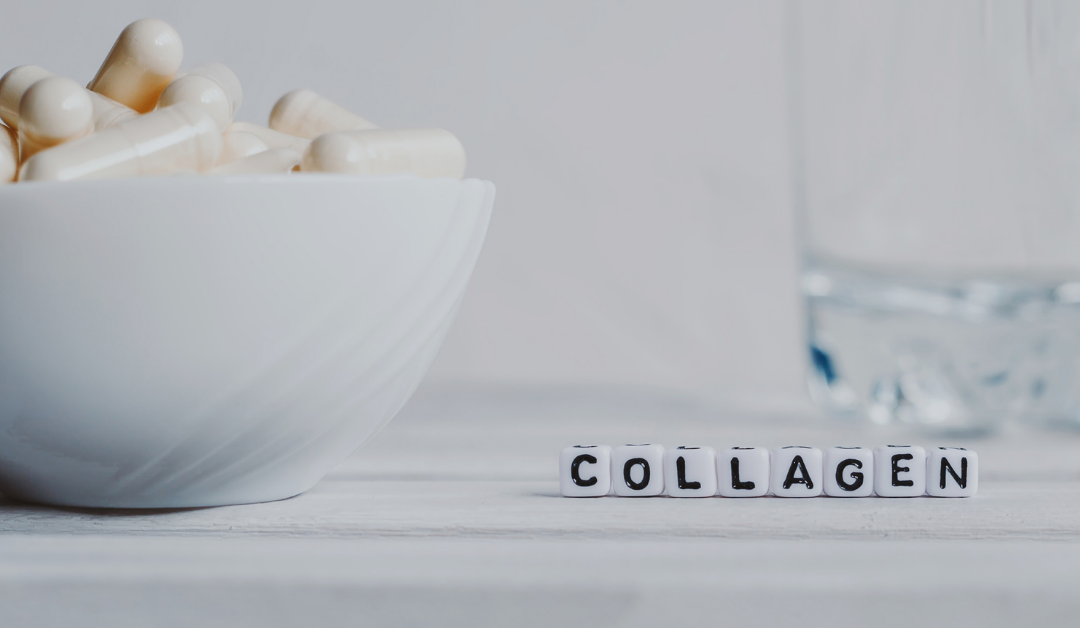There has been much interest over the past few years on collagen and anti-ageing foods, supplements, powders, serum and creams to improve our youthfulness.
But should we engage in the media hysteria around collagen products.
WHAT IS COLLAGEN
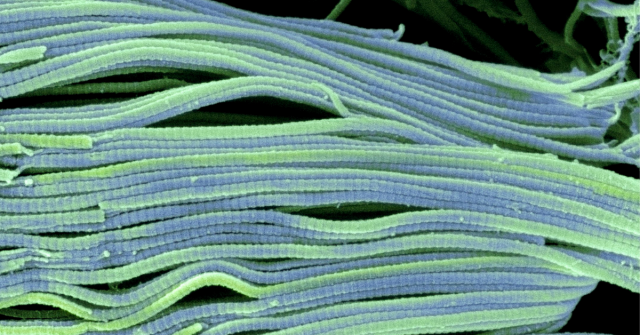
Collagen Fibrils
Collagen is the most abundant protein in the body. It’s found in bones, muscles, skin, cartilage and tendons and connects other tissues which helps to make us strong and resilient. It is the main structural protein found in the body’s various connective tissues. Collagen makes up approximately a third of the whole body protein content.
Collagen is also abundant in corneas, blood vessels, the gut, intervertebral discs and dentin in teeth.
Most collagen molecules are packed together to form long, thin fibrils (threads of fibrils make up fibres). They act like scaffolding between the connective tissues. There are 28 known different types of collagen. All have different structures and functions.
There are 5 types of collagen that the health, fitness and cosmetics industry are focussed on.
|
Type l |
Type l is the most abundant and makes up about 90% of the body’s total collagen. Type 1 collagen promotes tissue repair and skin health. This means that type 1 collagen can help with forming our skin, tendons, blood vessels and other connective tissues. Type 1 collagen is usually sourced from fish or bovine (cattle) and features proline, glycine, and hydroxyproline. |
|
Type ll |
Type II is the primary type of collagen found in the connective tissue known as cartilage. Since there is a focus on cartilage with type II collagen, consuming it is thought to promote healthy joints and cartilage growth. Type II collagen is usually sourced from chicken bone broth but can come from cows. |
|
Type lll |
Type III is a component in our skin and organs, making it fibrillar collagen. It is abundant in our intestines and has been thought to aid in the synthesis of blood platelets. Type III collagen is often used when building muscle or working towards weight loss. It can be sourced from cows and eggs. |
|
Type V |
As a more minor collagen component, type V collagen helps to form interstitial fibers. This makes it a structural component in tendons and ligaments. It also functions to create cells of a pregnant woman’s placenta. So, it is thought to support neonatal development and eye health. It is commonly sourced from egg whites and the eggshell membrane. |
|
Type X |
Type X collagen is known as a network forming collagen. It is thought to promote bone health and new bone growth. Type X collagen is often sourced from cows, chickens, and eggs.
|
SOME OF THE REPORTED BENEFITS ASSOCIATED WITH COLLAGEN SUPPLEMENTATION
- skin structure preservation
- wound healing
- anti-aging support
- osteoarthritis prevention
- bone loss prevention
- muscle mass improvement
- hair and nail health
- reduced rheumatoid arthritis symptoms
DO COLLAGEN SUPPLEMENTS WORK?

Collagen Supplementation?
We know that age decreases the amount of collagen we produce. But can collagen supplementation slow down or even reverse the impacts of ageing.
And which supplements to take?
One of the criticisms of collagen supplements is that they are broken down and destroyed by acids and enzymes in the gut.
However, hydrolysed collagen (HC) is a process where water molecules rupture the chemical bonds. This means that the collagen remains intact form while the blood delivers the collagen to the skin and joints.
A small 2015 study investigated the impact of hydrolysed collagen supplements on skin health and appearance in post-menopausal women.
The supplements contained additional anti-aging ingredients, including hyaluronic acid, vitamins, and minerals.
The study found that the oral supplement led to a significant reduction in wrinkle depth and a noticeable improvement in skin elasticity and skin hydration.
Gelatin is a protein obtained by boiling skin, tendons, ligaments, and/or bones with water. It is usually obtained from cows or pigs.
Gelatin supplements can cause gut issues due to the large units of peptides. This can lead to stomach upset, bloating and burping. Some people have allergic reactions to Gelatin supplements.
The other common form of supplementation is Undenatured Collagen. This is collagen derived from chicken cartilage. There is some evidence that Undenatured Collage is good for joints.
SUPPLEMENT OR REAL FOOD
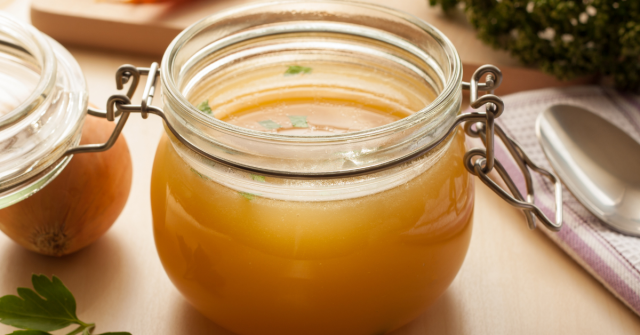
Collagen Chicken Broth á la carte
Because dietary supplements vary in quality and are not regulated as rigorously as drugs, I am sceptical of the health benefits associated with any form of dietary supplementation outside Vitamin D.
My concerns expressed about collagen supplements can be addressed by looking for where companies get their bones and tissues from. What are they adding? Are they free range and organic?
Powder supplementation is another way to get your collagen. You can choose separate types of collagen powders or some do all 5 types of collagen.
If you want to consume collagen naturally, homemade broth from chicken, fish and beef is the way to go. Boosting collagen through the consumption of a healthful and varied diet is likely to be safer and more beneficial for health.
If you are short on time and cost isn’t an issue, you can purchase organic bone broth from companies like the Mindful Chef and the Bone Broth Company.
To maintain good collagen levels, people should limit or avoid foods containing excess added sugar. Sugar can cross-link with collagen fibers and produce compounds called advanced glycation end products (AGEs). These compounds can damage the body.
Note that there aren’t any vegan substitutes for collagen. Supplements may be free of dairy, gluten or sugar, but collagen is only available from animal sources.
However, there is a product called “agar agar” that is sometimes marketed as “gelatin,” but it is vegan.
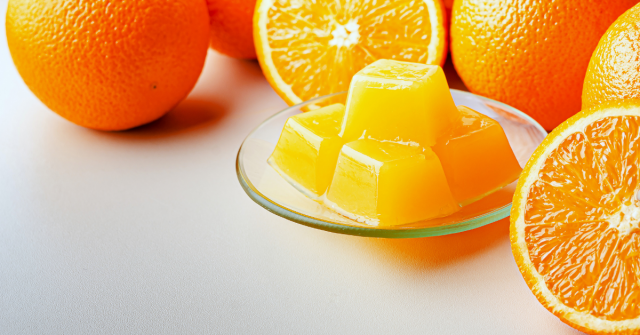
Agar Agar. Plant-based gelatin derived from seaweed
We also synthesis our own collagen. You need to include certain vitamins and minerals to help with collagen synthesis.
The table below lists the different micronutrients that help with collagen synthesis, alongside their associated food sources.
| MICRONUTRIENT | FOOD SOURCES |
| Vitamin C | Citrus fruits
Strawberries Blackcurrants Red & Green Peppers Broccoli & Leafy Greens Brussel Sprouts Potatoes & Tomatoes |
| Zinc | Meat
Shellfish Cereals & Seeds Bread (Dairy) |
| Manganese | Tea
Nuts Green Vegetables Cereals Bread |
| Copper | Nuts
Shellfish Organ Meats |
COSMETIC COLLAGEN CREAMS

Is collagen cream anti-ageing?
There has been a growing interest in topical collagen supplements like creams, masks and serums in the cosmetics industry.
Most topical collagen supplements target skin health, so they are thought to be within the type 1 collagen category. Often sourced from fish and cows, type 1 collagen is believed to contain a wide array of amino acids. Some of these amino acids include proline, glycine, and hydroxyproline.
However, there is a debate about whether or not applying a collagen serum or cream to the skin actually works.
The key thing to know is that our skin doesn’t absorb all creams equally. And the absorption rate likely depends on the size of the collagen molecule being used. Since this can be a bit difficult to confirm, most experts lean towards the idea that consuming collagen is the best way to get any health benefits.
WHAT’S THE BEST WAY TO GET YOUR COLLAGEN
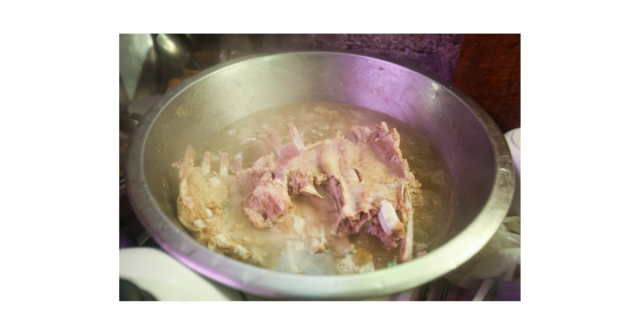
Eat naturally
Hydrolysed collagen supplementation is the most efficient way to absorb collagen through powder or tablet form. There are companies now promoting and selling nano-hydrolysed collagen supplements which are even more absorbent by using fruit enzymes to predigest the supplement.
Personally, I believe that nature is the best answer. As humans, we over complicate matters.
While we’ve had agriculture for between 5000-10,000 years, it is only much more recently that food has been sold to us in packages, having been prepared elsewhere by people we all never meet.
Now we have access to unlimited supplies of supplements and convenience foods whenever we want them.
Our DNA is largely as it was before the advent of agriculture meaning we are far better equipped to eating moderate amounts of whole foods, plants and the occasional piece of animal meat or fish.
Simply – eat local real food that contains collagen.
The best way is always choose the path of less resistance. When you next have a Sunday lunch, boil the animal carcass for a hearty and rich beef or chicken broth flooded with collagen.
Or purchase organic animal broth from a local reputable supplier.
“The UK supplements market is set to exceed £429m in 2022 and increase to over £483m by 2026”

